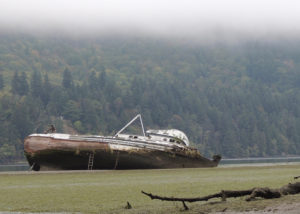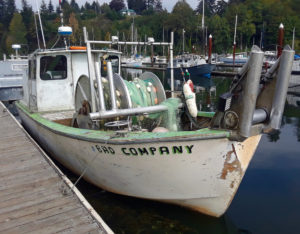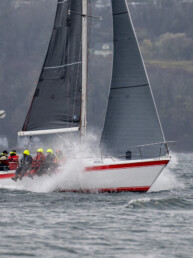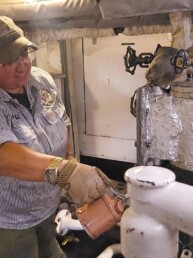With miles of backwater sloughs, scads of wildlife, and no competition for anchorages, I’ve often wondered why the Lower Columbia River is so empty of small cruising boats like mine. Row Bird is frequently the only one around, and surely the only boat with a captain under sixty. Sometimes it feels like my older friends and I who cruise the area constitute a secret society.
Last fall, I found myself with an unexpected three-day weekend and rang up some pals who live and boat near Puget Island, Washington. Puget and its companion, Little Island, sit near the Washington shore, separated by a major side-channel
of the Columbia.
“I’m heading downriver,” I said.
“Stop by,” they urged.
I arrived late on a Friday afternoon with the idea of looping the island’s 15-mile circumference over the long weekend, starting from the Elochoman Marina in nearby Cathlamet, Washington. Retired, local small craft guy, Allen, met me at the parking lot as I rigged Row Bird up. We told stories, caught up on boat gossip, and swapped home-made goodies.
 But by the time I was finally ready to launch, there were dark clouds and a stiff breeze out on Cathlamet Channel. I wasn’t keen to sail away and prospect for an anchorage at Puget Island, so I rowed out of the marina and turned into the protected waters of the adjacent Elochoman Slough. I passed a few houses and rowed a thousand feet more, just to the brushy edge of the Julia Butler Hansen National Wildlife Refuge.
But by the time I was finally ready to launch, there were dark clouds and a stiff breeze out on Cathlamet Channel. I wasn’t keen to sail away and prospect for an anchorage at Puget Island, so I rowed out of the marina and turned into the protected waters of the adjacent Elochoman Slough. I passed a few houses and rowed a thousand feet more, just to the brushy edge of the Julia Butler Hansen National Wildlife Refuge.
Aquatic weeds reached up from the muddy bottom. Probing with an oar, I noticed they were in just two feet of water; a few dark spots nearby showed a somewhat deeper bottom — how deep I wasn’t yet sure. The tide was predicted to drop another five feet. I knew the weeds wouldn’t survive in the air for long, but if I was reading the tide table correctly, everything around me would soon turn to mud. That wouldn’t be a problem for the boat, but it would complicate things if I wanted to leave at low tide the next day.
A gray haired man nearby in a single-seat 15-foot aluminum boat gave me a friendly wave. He was clearly determined to stay out fishing until the last minute. Avoiding a few submerged logs, I found a hole, tossed out my lead line, and was satisfied to set my anchor in eight feet of water.
Morning brought a clear sky and a faint breeze. Best of all, I was still afloat. I sailed out of the slough and slowly made my way towards Puget Island, a mile distant. As I arrived, I encountered the old fisherman again, just in time to watch him get dive bombed by an eagle.
He was sitting at anchor, rod extended over the water and appeared quite calm, all things considered. As I sailed up, I asked if this kind of thing happened to him often.
“Oh yes, he just sits up in that tree, waiting until I have two or three fish in the cooler,” he said matter of factly. “Then he just starts screaming.” Predatory fowl or not, fishing seemed like a good way to spend the day.
I turned upstream in Birnie Slough, which separates Puget from Little Island. The area is a treasure trove of lost dreams; rusting hulks of old fishing boats and half finished yachts line the banks. But the lawn chairs set out on its many docks indicate that this hideaway area is still well-used and appreciated. A few barking dogs chased me from shore as I pottered along, enjoying the morning stillness and waving to the occasional neighbor.
When I got back to Cathlamet Channel, I’d traveled about three miles and had three more to go before I could round the tip of the island to take advantage of the current and wind that was now on my nose. I’d hoped to make it to my friend Michael’s house on the other side of the island by early afternoon. But soon I noticed a skinny slough ahead. According to my chart, it sliced off the top couple of miles from the island — if the tide was high enough. Hovering at the entrance, I watched the tide fill the channel, weighing the risk of getting stranded, or having to turn around, against the thrill of floating through a route inaccessible to most boats.
 What the heck, I thought, turning Row Bird into the slough and surging forward, sped up by the current. I was thrilled at my pace, but leery of the banks and overhanging shrubs that threatened to snag my mast. Then, a few thousand feet in, I grounded on a sandbar. The water looked deeper ahead, I told myself, so I climbed out of Row Bird and tugged her to a deeper pool. Five hundred feet later, I was certainly in deeper water, as evidenced by an old motor boat moored to a tiny dock, but it was choked with weeds. Even if I used my oar to pole along, I could barely make progress. Would the incoming tide help my situation, I wondered, or leave me hopelessly stranded? Checking my GPS, I could see that I was nearly two-thirds of the way through my shortcut, but my path forward was uncertain.
What the heck, I thought, turning Row Bird into the slough and surging forward, sped up by the current. I was thrilled at my pace, but leery of the banks and overhanging shrubs that threatened to snag my mast. Then, a few thousand feet in, I grounded on a sandbar. The water looked deeper ahead, I told myself, so I climbed out of Row Bird and tugged her to a deeper pool. Five hundred feet later, I was certainly in deeper water, as evidenced by an old motor boat moored to a tiny dock, but it was choked with weeds. Even if I used my oar to pole along, I could barely make progress. Would the incoming tide help my situation, I wondered, or leave me hopelessly stranded? Checking my GPS, I could see that I was nearly two-thirds of the way through my shortcut, but my path forward was uncertain.
I decided to cut my losses and retreat back to Cathlamet Channel, where I clawed my way upriver, rounded the top of the island, and found that the wind had shifted back on my nose again. The combination of wind against current made for splashy sailing, but now I was making tangible progress. By the time I was approaching Michael’s house, I was cold, tired, and three hours late. He had to leave on other errands, so I arranged to meet him in the morning.
After a quiet night in a bight, I rowed up to his waterfront house and beached Row Bird, grateful for company and a hot cup of coffee. We chatted about boats and life for a while; but when the tide started to turn in my favor, I decided to complete my circumnavigation, this time with a little less effort.
As I rounded the final bit of island and prepared to head back to Cathlamet, there was that fisherman again. “Good morning to you,” I called. “Out all night?”
“Oh, no, just back to get some more pikeminnow.”
“How’s the catching?” I asked.
He shrugged, “Wasting bait, wasting time.”
“Oh?” I asked, a little surprised.
This time he smiled. “There’s no place better to do it, though.”
We nodded at each other, two stalwart members of the Lower Columbia’s secret society of boaters, united in appreciation of our less-traveled haven.
Bruce Bateau sails and rows traditional boats with a modern twist in Portland, Ore. His stories and adventures can be found at www.terrapintales.wordpress.com.
Bruce Bateau
Bruce Bateau sails and rows traditional boats with a modern twist in Portland, Ore. His stories and adventures can be found at www.terrapintales.wordpress.com






